INTERNACIONAL
Al menos 31 muertos en Gaza durante nuevos ataques en operativos de distribución de ayuda

Al menos 31 palestinos murieron y más de 145 resultaron heridos este martes mientras intentaban acceder a la limitada ayuda humanitaria que Israel permite ingresar a la Franja de Gaza, cuya población enfrenta una creciente crisis alimentaria. Así lo informaron fuentes médicas citadas por la agencia española EFE, en un contexto donde los corredores dispuestos para la entrada de suministros presentan altos niveles de violencia.
Cerca del puesto militar de Zikim, el único paso fronterizo actualmente operativo en el norte de Gaza para la entrada de camiones con ayuda, fuerzas israelíes dispararon contra una multitud de personas que esperaba recibir asistencia. Una decena de palestinos perdió la vida en ese incidente, según los relatos recabados.
Otro ataque fue reportado junto al corredor de Netzarim, en el centro de la Franja, donde Israel bombardeó con un dron un grupo de civiles que aguardaban por la llegada de vehículos con suministros. El hospital Al Quds informó que hubo una persona muerta y más de veinte resultaron heridas. La situación se agravó en diferentes puntos de distribución militarizados, gestionados por la Fundación Humanitaria para Gaza (GHF, por sus siglas en inglés), organización respaldada por Israel y Estados Unidos pero bajo amplio cuestionamiento de Naciones Unidas. Trece de las víctimas mortales de este martes se registraron en un centro de ayuda de GHF al sur de Wadi Gaza y otras siete en el sur, en Rafah.
Desde el inicio de las operaciones de GHF a fines de mayo, el Ministerio de Sanidad gazatí contabilizó 1.179 muertos y 7.957 heridos en incidentes vinculados a la recogida de ayuda, asociados a disparos del ejército israelí. Las muertes relacionadas con la hambruna muestran tendencias ascendentes, según las autoridades sanitarias locales, que atribuyen la situación crítica a las estrictas restricciones impuestas por Israel al ingreso de alimentos y medicinas.
A la emergencia humanitaria se sumaron nuevos episodios de violencia. La Defensa Civil de Gaza contabilizó 30 muertos, incluidos 12 menores, en recientes bombardeos nocturnos sobre el campo de refugiados de Nuseirat, en el centro del enclave. Relatos directos describieron escenas de destrucción en viviendas y una elevada presencia de familias afectadas por el conflicto.
Las agencias humanitarias de la ONU renovaron este martes el pedido de incrementar la entrada de ayuda a Gaza de manera urgente y sostenida, argumentando que la región enfrenta riesgo de hambruna masiva. La directora del Programa Mundial de Alimentos, Cindy McCain, subrayó la necesidad de suministrar “alimentos a gran escala, de forma inmediata y sin obstáculos”. Organizaciones como UNICEF y FAO respaldaron ese llamado.
El reporte más reciente de la Clasificación Integrada de la Seguridad Alimentaria (IPC), entidad respaldada por Naciones Unidas, indicó que la crisis alcanzó un “punto alarmante y mortal”. Más de 20.000 niños han sido tratados por desnutrición aguda entre abril y mediados de julio en Gaza y los hospitales reportaron al menos 16 muertes de menores de cinco años en menos de dos semanas.
Si bien Israel anunció ceses temporales en los combates y cierta flexibilización en la entrada de camiones con ayuda, las agencias humanitarias consideran que las medidas actuales no alcanzan para atender las necesidades de la población, que estuvo sometida a un bloqueo total durante casi dos meses. Entre las acciones internacionales recientes, este martes se realizaron lanzamientos aéreos de víveres y el Reino Unido anunció el envío de cargamentos adicionales de ayuda.
En el plano diplomático, el primer ministro británico Keir Starmer declaró que el Reino Unido reconocerá al Estado de Palestina en septiembre si el gobierno israelí no implementa medidas concretas para mejorar la situación en Gaza, como acordar un alto el fuego y permitir que la ONU reanude el suministro de ayuda. Starmer insistió en que este reconocimiento busca contribuir a la perspectiva de una solución de dos Estados. Francia también anunció que respaldará el reconocimiento de Palestina ante la Asamblea General de la ONU.

Mientras tanto, el gobierno israelí mantiene su posición y atribuye al grupo terrorista palestino Hamas la responsabilidad de la crisis humanitaria, acusando a ese grupo de saquear la ayuda y manipular los datos de víctimas. La oficina del primer ministro israelí Benjamin Netanyahu sostuvo que Hamas dispara contra palestinos que buscan asistencia, lo que agrava el acceso a los alimentos.
La guerra en Gaza se inició tras el ataque de Hamas el 7 de octubre de 2023, que dejó 1.219 muertos en Israel, en su mayoría civiles. Desde entonces, la ofensiva israelí ha causado más de 60.000 muertos en Gaza, también en su mayoría civiles, de acuerdo con datos del Ministerio de Salud del enclave, cifras validadas por la ONU. Por otra parte, Israel rechaza la presión internacional para un alto el fuego, definiéndola como una “campaña distorsionada”.
(Con información de AFP y EFE)
Middle East,Military Conflicts,Beit Lahia
INTERNACIONAL
Panorama Internacional: 146.500 bombas de Hiroshima, 80 años después, ¿qué no aprendimos?
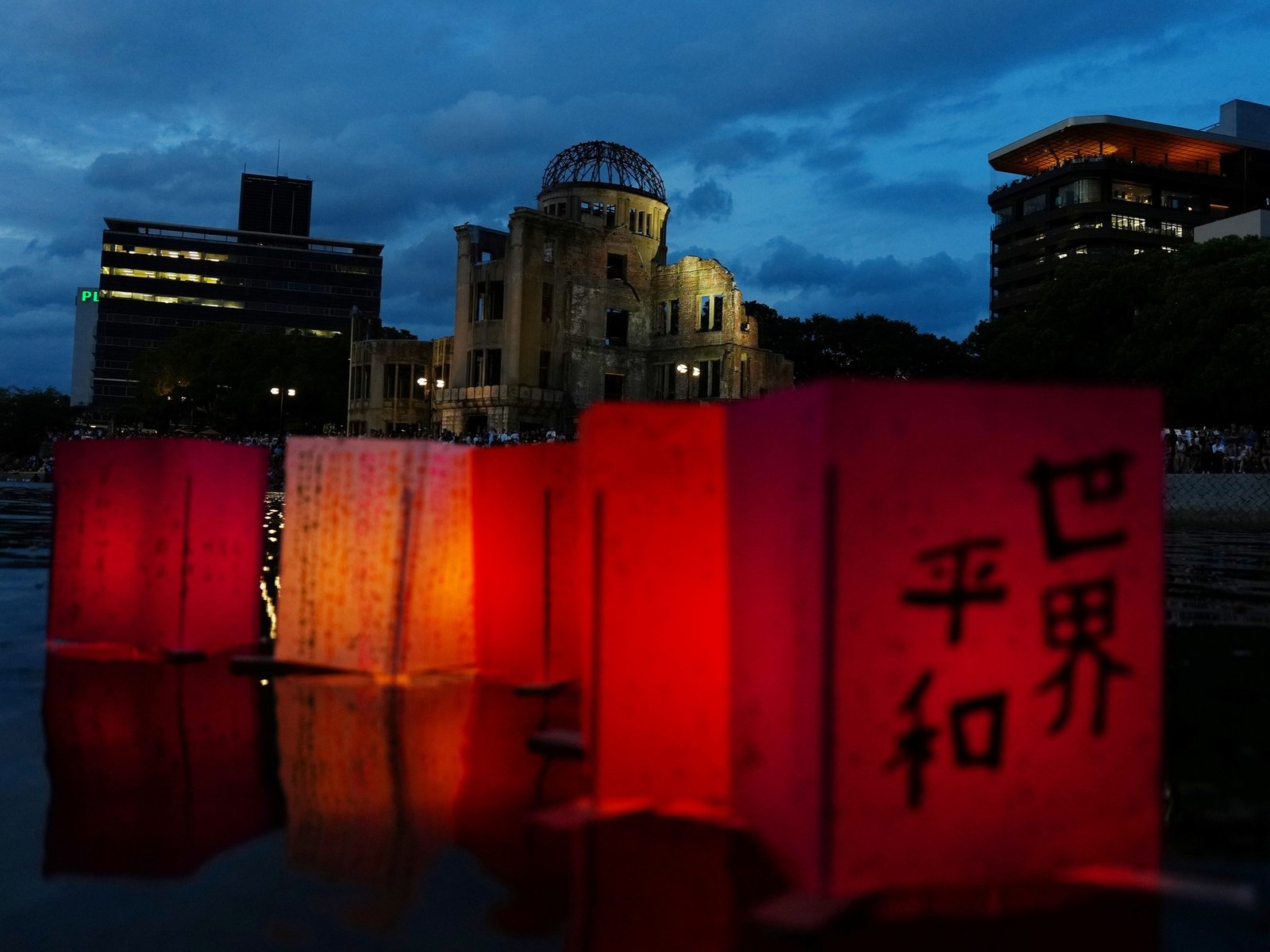
El arsenal actual
INTERNACIONAL
Trump’s Senate closer: Republican freshman emerges as key White House ally
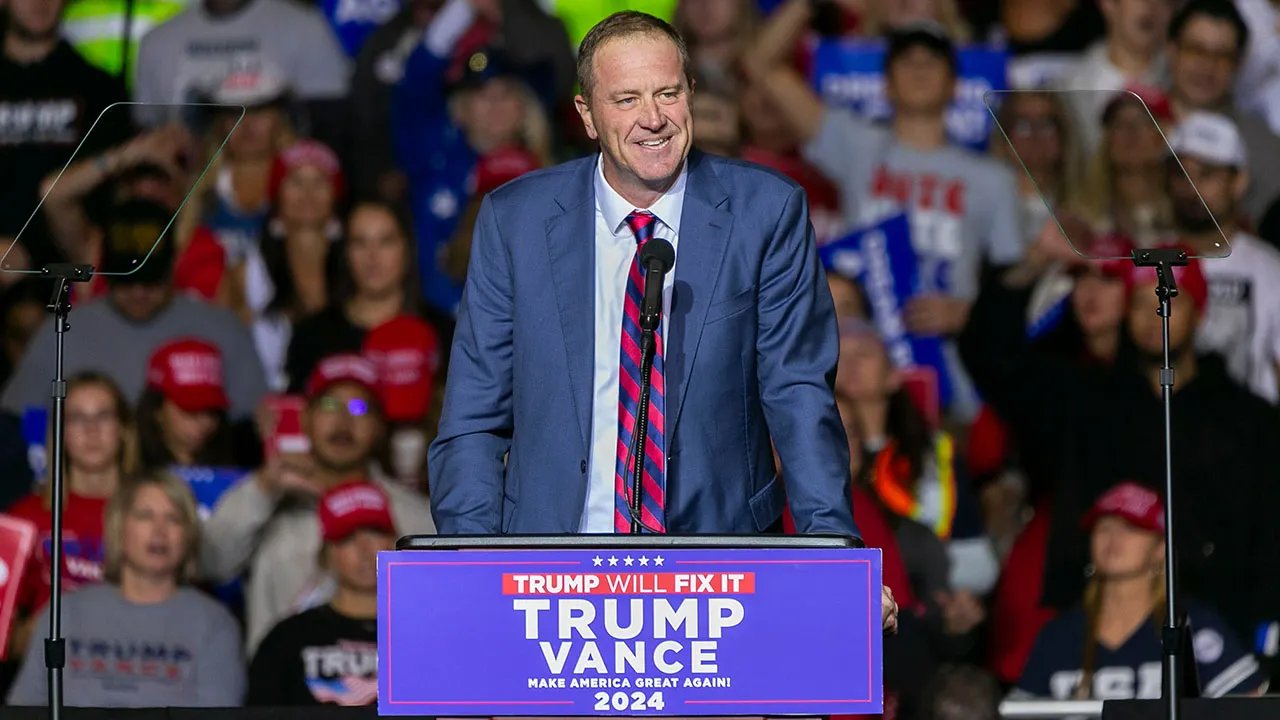
NEWYou can now listen to Fox News articles!
FIRST ON FOX: Senate Republicans last month were able to advance President Donald Trump’s desire to clawback billions in federal spending, an effort carried to fruition for the first time in nearly three decades by a first-term senator.
While the effort to slash funding to NPR, PBS and foreign aid was born in the White House, it was executed thanks in large part to Sen. Eric Schmitt, R-Mo.
Schmitt, who was first elected to the Senate in 2022, has become an envoy of sorts for Trump’s agenda in the upper chamber. He has a strong relationship with the president that dates back to his first campaign, which has developed into a regular invite to join Trump for rounds of golf.
‘LONG OVERDUE’: SENATE REPUBLICANS RAM THROUGH TRUMP’S CLAWBACK PACKAGE WITH CUTS TO FOREIGN AID, NPR
Senator Eric Schmitt, a Republican from Missouri, during a campaign event with former President Donald Trump, not pictured, at the Fiserv Forum in Milwaukee on Nov. 1, 2024. (Jim Vondruska)
He’s launched probes against former President Joe Biden’s alleged mental decline, helped smooth over concerns during passage of Trump’s «big, beautiful bill» and contends that «intuitively» he understands the president’s America First message.
And his role in bridging the gap between the White House and the Senate, along with negotiating among his conference to get the $9 billion package across the line, has seen his stock rise immensely within the Senate GOP.
But, in an interview with Fox News Digital, he said his entire goal is to just be helpful.
«I think I approach it with that kind of humility,» Schmitt said. «But I also, I want to be successful, and I want the agenda to move forward. I think it’s really important. Being on the golf course with President Trump is a great honor, and we have a lot of fun. He’s a very good golfer.»
Schmitt, who previously served as Missouri’s attorney general before launching a bid for the Senate, regularly clashed with the Biden administration and said that his role of rebuking lockdowns, vaccine mandates, censorship and mass migration informed how he currently views legislating.
SENATE TO DEBATE TRUMP’S $9B CLAWBACK BILL AFTER DRAMATIC LATE-NIGHT VOTES
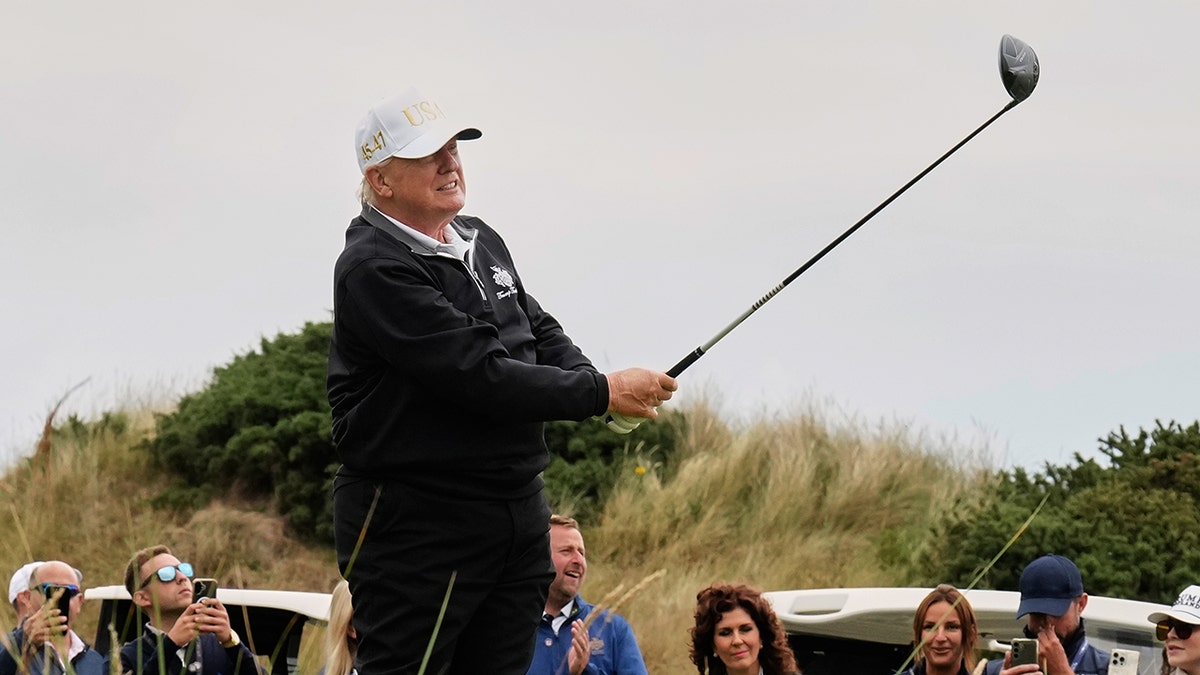
President Donald Trump tees off during the opening ceremony for the Trump International Golf Links golf course, near Aberdeen, Scotland, on July 29, 2025. (AP Photo/Jacquelyn Martin)
«My job was to stand in the gap and fight back, with the hopes that President Trump would return,» he said.
Trump endorsed Schmitt in 2022, and in return the lawmaker became one of the first senators to back his reelection campaign the following year. That turned into Schmitt becoming a mainstay on the campaign trail, jetting across the country in Trump Force One where «Big Macs and double cheeseburgers and quarter pounders with cheese» flowed.
And when Trump won, Schmitt had the opportunity to leave the Senate and join the administration as attorney general, but he opted to stay in the upper chamber.
Had he jumped ship, Trump’s recissions package may not have been able to pass muster with the Senate GOP, where appropriators raised concerns about the impact that clawing back already agreed-upon spending would have on the government funding process and others raised issues with the funding that was targeted.
«This wouldn’t have happened without Eric Schmitt,» Sen. Katie Britt, R-Ala., told Fox News Digital.
Britt was part of the same 2022 class of freshman senators as Schmitt, which included other notable Republicans, like Sen. Markwayne Mullin, R-Okla., and Vice President J.D. Vance.
She said Schmitt’s leadership on the rescissions package, like listening to lawmakers’ concerns and negotiations with Senate Appropriations Committee Chair Susan Collins, R-Maine, to take the lead on the package, led to a final product that could actually pass in the diverse Senate GOP.
‘SHOULD HAVE BEEN PREPARED’: GOP SENATORS FIGHT FOR UNIFIED MESSAGE ON TRUMP’S ‘BIG, BEAUTIFUL BILL’
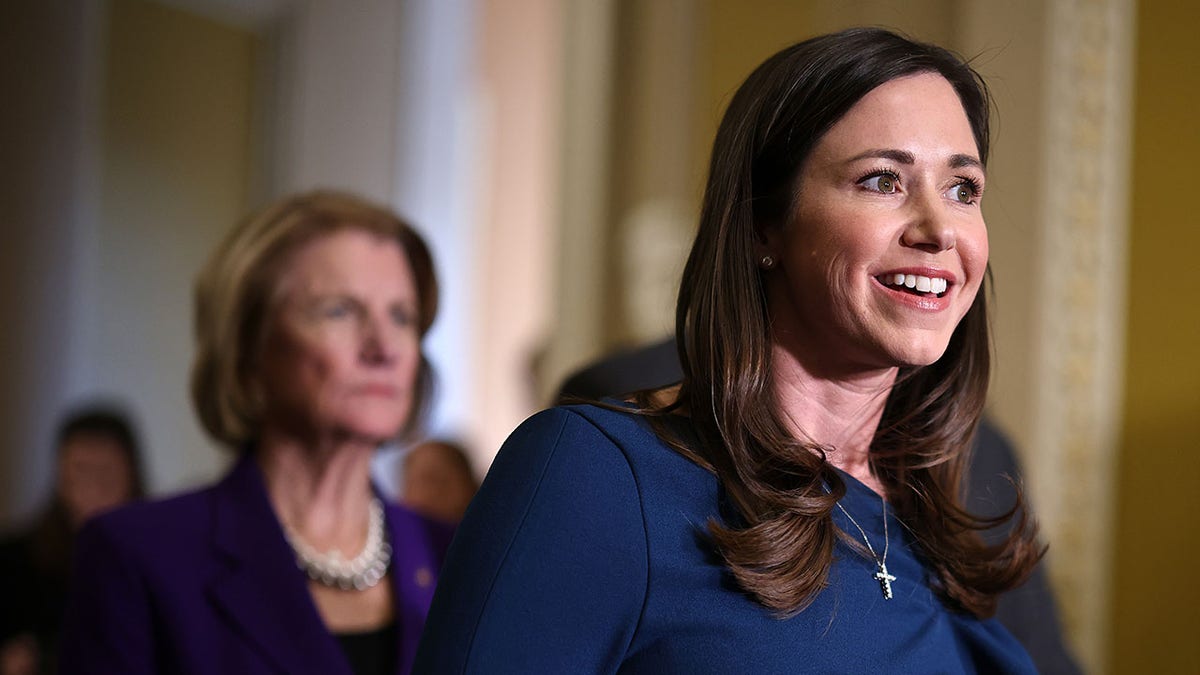
Sen. Katie Britt talks to reporters following the weekly Senate Republican Caucus policy luncheon at the U.S. Capitol on January 14, 2025, in Washington. (Chip Somodevilla)
Indeed, Schmitt agreed to allow as many amendments to the bill as lawmakers wanted and included his own change to the clawback that would save funding for global AIDS and HIV prevention — a key change that helped bring more Republicans on board.
«When Eric speaks, people listen,» Britt said. «And he is thoughtful about when he uses his voice, and when he does it most definitely makes an impact.»
Schmitt, however, is more humble in how he views his part in the process.
«People can label,» Schmitt said. «I don’t get too hung up on any of that. Like for me, honestly, I feel fortunate to be in the position that I’m in. There’s really not a lot of daylight between the President’s agenda and the things that I support.»
Still, he was hopeful that another recissions package would come, describing it as «a good exercise for us,» but noted that the timing for the remaining fiscal year would be tricky given the GOP’s continued push to blast through Democrats’ blockade on nominees and the looming government funding deadline when lawmakers return after Labor Day.
But getting the first one done was key to opening the door for more.
«I think that was also part of what was on the line,» he said. «When we were, you know, in the middle of the night, trying to make sure we had the votes, was that we have to prove that we have the ability to do it. And once you do it, there’s muscle memory associated with that. There’s a cultural shift in how we view things.»
CLICK HERE TO GET THE FOX NEWS APP
However, Senate Minority Leader Chuck Schumer, D-N.Y., has demanded that Republicans commit to a bipartisan appropriations process and eschew further rescissions packages.
Should another come from the White House in the waning days of this fiscal year, it could spell trouble in Congress’ bid to avert a partial government shutdown by Sept. 30.
«I really think it would be a bad idea for Republicans to alter our course of action based on what Democrat threats are,» Schmitt said. «At the end of the day, they’re an obstructionist party without a message, without a messenger.»
politics,senate,donald trump,republicans
INTERNACIONAL
Trump’s deadline on secondary tariffs arrives; US-Russian relations hang in the balance
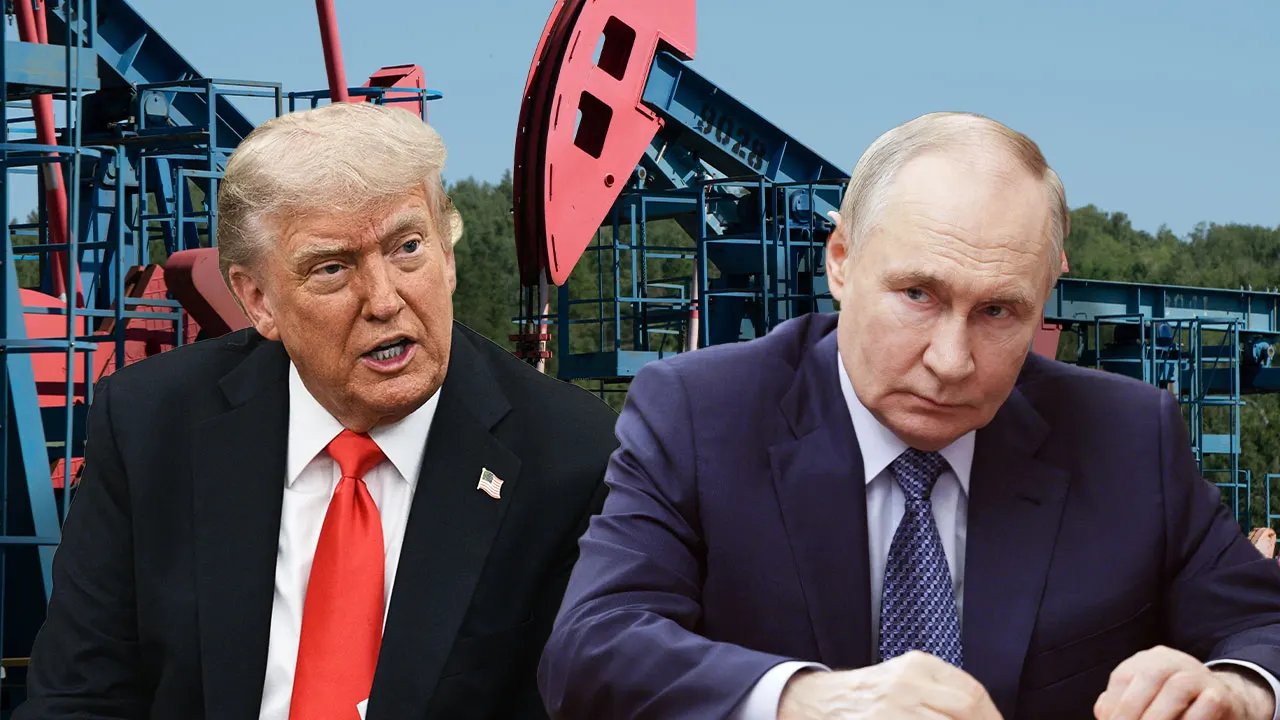
NEWYou can now listen to Fox News articles!
President Donald Trump is preparing to announce new secondary tariffs Friday on nations who conduct trade with Russia amid its deadly war in Ukraine.
The White House has remained tight-lipped on what those tariffs will look like after the president first said in July they would amount to «100%» tariffs before causing confusion earlier this week when he told reporters he «never said a percentage.»
While the specifics of what tax rates nations that trade with Russia could face remain unclear, Trump’s change in posture toward Russian President Vladimir Putin has become increasingly evident.
President Donald Trump, right, meets Russian President Vladimir Putin on the first day of the G20 summit in Osaka, Japan, June 28, 2019. (Kremlin Press Office/Handout/Anadolu Agency/Getty Images)
FROM TALK TO TACTICS: TRUMP PIVOTS ON RUSSIA STRATEGY TO END WAR
«Trump’s frustrated that the Russians have not taken advantage of his patience and generous offers, but it’s very interesting that even after Trump announced he was moving submarines, and even after he announced the tough tariffs, the Russians still want to talk to him,» Fred Fleitz, who served as a deputy assistant to Trump and chief of staff of the National Security Council during the president’s first term, told Fox News Digital.
«Putin does not want to anger Trump,» he added. «Putin never worried about angering Biden, and I think that this shows a degree of respect.
«It shows what Trump has achieved by exercising leadership on the global stage. And we’ll see what happens,» Fleitz said, adding he hoped it was not merely a stalling tactic by Putin.
Trump’s return to the White House brought with it a sense of shock as he appeared to distance Washington from its top allies in Europe in favor of attempting to improve diplomatic relations with Putin, culminating in the infamous Oval Office showdown with Ukrainian President Volodymyr Zelenskyy in February.
While the tussle brought renewed support from his top MAGA base, who favor ending U.S. involvement in foreign wars, it prompted concern among security experts. Ultimately, Trump’s patience with Putin began to shift, with the president consistently expressing his frustration at the Kremlin chief’s continued brutal attacks in Ukraine.
In mid-July, while sitting next to NATO Secretary General Mark Rutte, Trump announced Putin had 50 days to enter into a ceasefire or face «very severe» tariffs that would affect Moscow’s top commodity, oil.
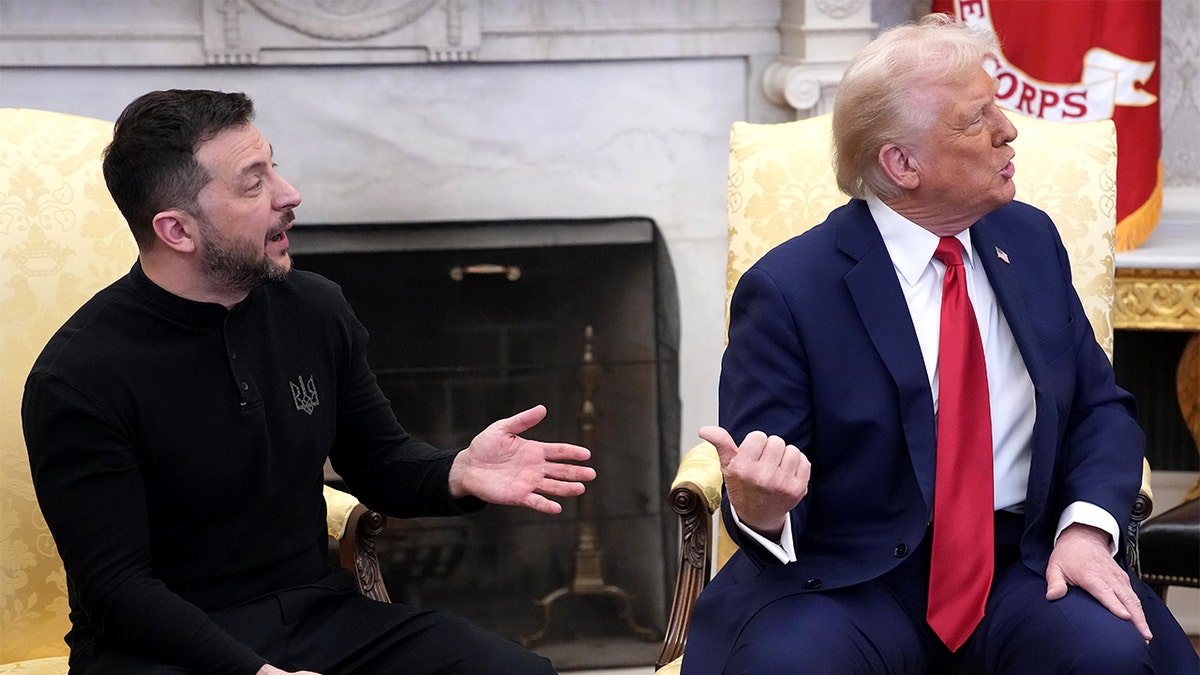
President Donald Trump and Ukrainian President Volodymyr Zelenskyy meet in the Oval Office of the White House Feb. 28, 2025, in Washington, D.C. (Andrew Harnik/Getty Images)
ZELENSKYY TELLS PUTIN TO ‘BE BRAVE’ AND FINALLY AGREE TO TRILATERAL MEETING WITH TRUMP
«Tariffs at about 100%, you’d call them secondary tariffs,» he had said, indicating that nations that trade with Russia will see 100% tariffs slapped on them when trading with the U.S.
This would most greatly affect China and India, according to data released by the U.S. government Thursday, which showed both nations account for 46% of all Russian oil purchases in 2025.
But the U.S. is also the No. 1 export market for both China and India, which means higher price tags at the checkout line on their products will make Americans think twice before completing those purchases.
After ongoing trade negotiations with both nations and Putin’s continued war effort in Ukraine, Trump last week pushed up his deadline to within 10 days of July 29, forcing a new deadline of Friday.
But while his promised tariffs were met with applause by some in the GOP, including Sen. Lindsey Graham, R-S.C. — he, along with Sen. Richard Blumenthal, D-N.Y., is pushing the charge for 500% sanctions on Russia — other Republican members have not backed the move.
Sen. Rand Paul, R-Ky., has been outspoken against not only Trump’s tariffs but the bipartisan sanction push and argued to Fox Business’ Larry Kudlow this week that Trump’s tariffs on allies and foes alike will amount to $2 trillion in taxes for the American consumer.
But Fleitz pushed back on this argument and said he is not convinced that the tariffs will hurt the U.S. or Chinese economy, though Russia and India are likely to feel the pain.
«I think they’re going to hurt the Russian and Indian economies,» he said, noting that India could recover by buying oil elsewhere. Though some reporting has suggested that India may have saved over $30 billion by increasingly turning to Russian oil during 2022-2024 due to Moscow’s price cuts.
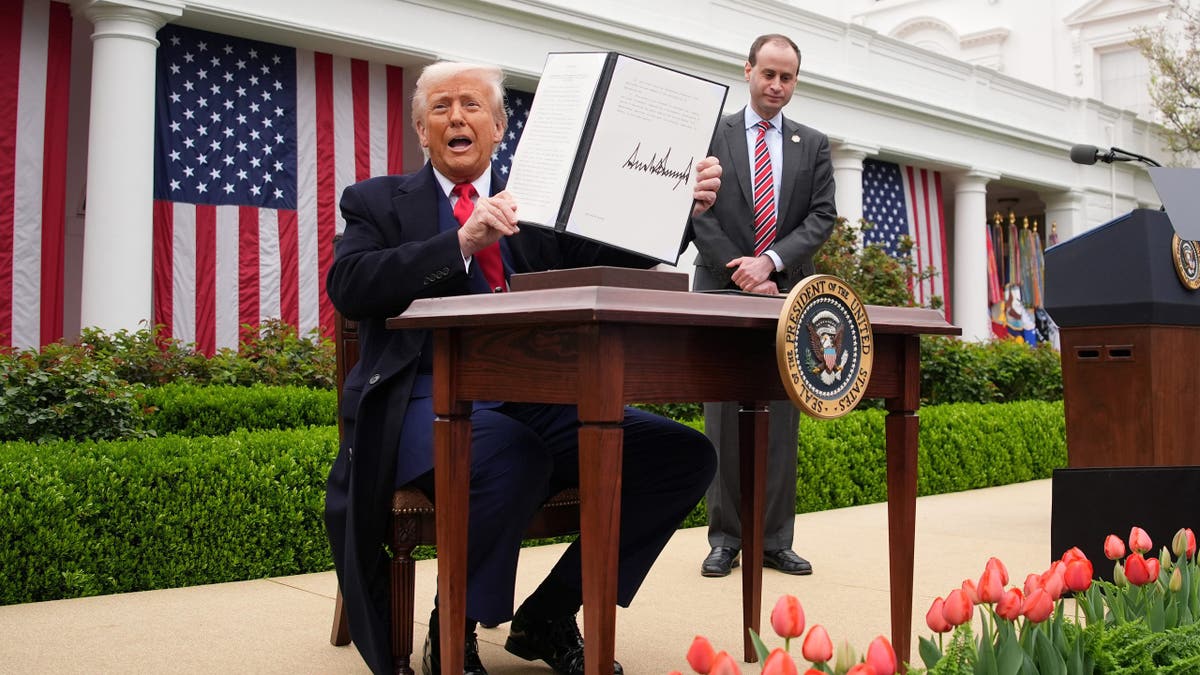
President Donald Trump displays a signed executive order imposing tariffs on imported goods during a «Make America Wealthy Again» trade announcement event in the Rose Garden of the White House April 2, 2025. (Getty Images/Andrew Harnik)
TRUMP OPEN TO MEET PUTIN FACE-TO-FACE NEXT WEEK FOLLOWED BY THREE-WAY TALKS WITH UKRAINE’S ZELENSKYY
«It is going to be another factor that’s going to pressure Putin to agree to a ceasefire. I don’t know if that’s going to happen immediately or in a few months, but I think it is going to put real pressure, inflict real pain on Russia,» Fleitz said.
Once a staunch Trump ally, Rep. Marjorie Taylor Greene, R- Ga., took to X this week in response to a post by Trump that he would be enforcing tariffs on India for purchasing Russian oil and said, «End Indian H1-B visas replacing American jobs instead and stop funding and sending weapons to the Obama/Biden/Neocon Ukraine Russia war.»
Trump’s favorable transition toward Ukraine and European allies has also ruffled some MAGA feathers, though security experts have argued it has given the president better leverage to take on major adversaries like Putin, and by extension, China.
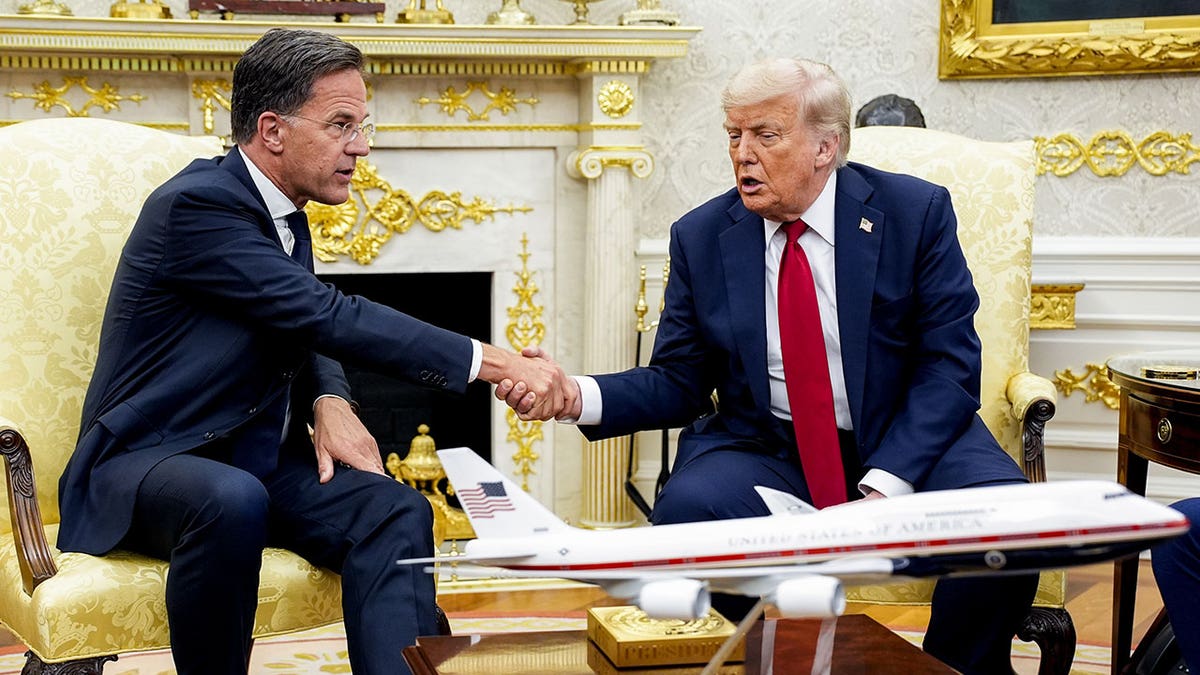
President Donald Trump, right, and Mark Rutte, NATO secretary general, shake hands during a meeting in the Oval Office of the White House in Washington, D.C., July 14, 2025. (Yuri Gripas/Abaca/Bloomberg via Getty Images)
CLICK HERE TO GET THE FOX NEWS APP
«Diplomacy and negotiations are a good thing,» said Fleitz, who serves as vice chair of the America First Policy Institute’s Center for American Security. «Peacemaking takes time, and the U.S.-Russia relationship was in a very bad situation when Trump came to office.
«I think these sanctions will hurt Russia very badly,» Fleitz continued. «The fact that Trump knows that secondary sanctions on India has, at least temporarily, hurt our relationship is really a remarkable sign of how committed Trump is to these sanctions.
«There’s not going to be exceptions. It’s not going to be some type of soft strategy with all kinds of loopholes,» he added. «I think it shows to Putin how serious Trump is, and it gives Trump leverage to negotiate with Putin.»
donald trump,vladimir putin,russia,india,china,world,sanctions

 CHIMENTOS3 días ago
CHIMENTOS3 días agoMalas noticias para Wanda Nara: por qué la bajaron misteriosamente de MasterChef: «No va a salir este año»

 POLITICA3 días ago
POLITICA3 días agoAxel Kicillof reclamó ante la Corte Suprema $12 billones que le adeuda Nación

 POLITICA2 días ago
POLITICA2 días agoSebastián Pareja justificó el armado de listas de LLA en la Provincia: “El desafío era dar una opción diferencial”


































